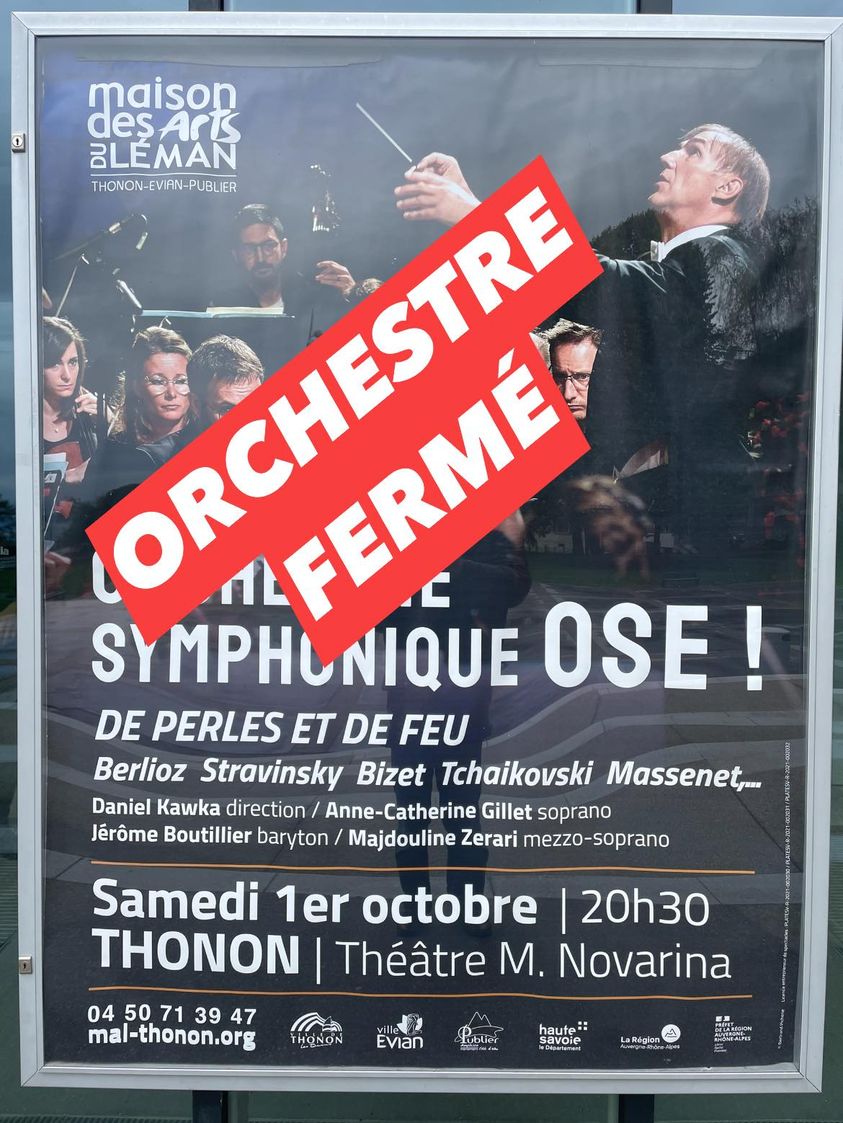An orchestra shuts down in France
OrchestrasIt is being reported by musicians that the Orchestre OSE of Lyon has quietly shut down.
Here’s an account by the baritone Jérôme Boutillier:

Ce n’est qu’en discutant au hasard d’une rencontre avec son (ex-) directeur musical, Daniel Kawka, un chef d’orchestre immensément musicien, sensible et dévoué qui recueille auprès de ses pairs admiration et respect, que j’ai appris non sans effroi que l’ensemble symphonique lyonnais OSE avait mis la clé sous la porte, dans la plus grande discrétion et l’indifférence générales. Le sentiment qui m’a glacé s’est empiré quand je me suis rendu compte que j’avais chanté leur tout dernier concert, en compagnie d’Anne-Catherine Gillet et de Majdouline Zerari : ce programme d’opéra franco-russe que nous avions donné à Thonon-les-Bains puis à Firminy à l’automne dernier.
Cette mort, faute de soutiens et notamment celui de la Région Rhône-Alpes, fait écho à une autre nouvelle, celle-ci relayée par les médias : la menace qui pèse sur le TNG de Lyon à cause de la suppression pure et simple de la subvention jusque là accordée par cette même région. (Article ici => https://shorturl.at/himFH)
Si on ajoute à cela que partout depuis bientôt un an les opéras de toute la France ou presque prennent l’eau et affrontent des difficultés monstres (l’Opéra-théâtre de Saint-Étienne qui s’est vu contraint d’annuler une production sur les cinq de sa prochaine saison… et il y a moult autres exemples)…
Euh…. C’est bon, on peut commencer à paniquer? Ou on continue à faire comme si de rien n’était?
Rappelons que nous avons encore la chance en France d’avoir une culture PUBLIQUE ; je dis bien => la CHANCE. Et que de cette chance nous avons le devoir de nous rendre dignes, et de montrer à nos pouvoirs publics sur l’ensemble du territoire qu’elle est essentielle et congénitale à l’exception culturelle de notre pays, tout comme notre Sécurité Sociale. (Et non, avec tout le respect et jusqu’à preuve du contraire, Hanouna ne fait pas partie de l’exception culturelle française)
Alors, c’est plus que jamais le moment, éteignez votre p@t%#*$ de téléviseur et foncez au théâtre, à l’opéra ou à la salle de concert la plus proche, pour « consommer » de l’art VIVANT sans aucune modération, au nom de votre santé mentale et spirituelle qui vous remerciera, ainsi que les artistes que vous ferez vivre.
Par pitié, ne donnons pas UN prétexte à nos édiles pour fermer les opéras et les théâtres, car la période est par trop fragile pour ces derniers et certains élus n’attendent que ça : en ces temps troublés, plus que jamais, prenez le risque de l’Art.
Daniel, Monique, Thierry… trop peu de gens ont dû vous le dire : du fond du cœur un grand MERCI d’avoir porté cet orchestre, d’avoir fait vivre et vibrer des musiciens et des chanteurs, d’avoir simplement cru en la musique. Je ne sais s’il existe encore un lieu où cela puisse un jour vous être rendu au centuple, mais j’ose le croire.
Gratitude et reconnaissance éternelles.







Comments